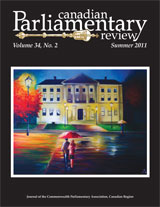The Transformation of Question Period
This article provides descriptive data on the number of prime ministerial interventions in Question Period from the 35th to the 40th Parliaments, including the ministries of Jean Chrétien, Paul Martin, and Stephen Harper. Cataloguing a total of 7,227 questions, this study classifies prime ministers’ answers by policy area and controls for the number of responses that relate to ethics and scandals across both majority and minority governments. The study underscores the stunning growth of prime ministerial interventions from a comparative, historical perspective with the advent of four-party politics in the House of Commons. The analysis suggests that while scandal was a central component in Question Period during the Chrétien and Martin ministries, and to a lesser degree in the last Harper minority government, allegations of wrongdoing typically comprised fewer than a third of all questions answered by the Prime Minister from 1994-2011.

